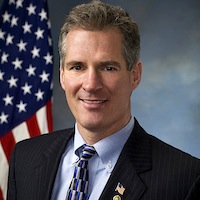Most of the world has united to mourn the passing of South Africa’s former president and anti-apartheid leader, Nelson Mandela. Global opinion is pretty consistently sure about how to come down on this one person’s legacy, and that’s favorably.
But one pocket of confusion remains. Lots of Republicans right now seem to be unsure whether to praise Nelson Mandela or call him a commie terrorist. On that latter point, I was shocked to see former Speaker Newt Gingrich not only praising Mandela but actually on CNN defending his ties to communist activists (who were partners in the fight against apartheid when the U.S. was too busy calling the regime a Cold War ally). In general, regardless of many of their past views, GOP leaders have been saying the right things, even if their base is furious about it.
I guess Mandela was always confusing for Republicans. If you’re a Republican, there have always been two schools of thought. You could go with the Republican Senators in 1986 who voted in favor of sanctions on the apartheid government. Or you could go with the Republican intellectuals and Saint Reagan who not only vetoed the sanctions (which was overridden by the Republican Senate majority and Democratic House) but recruited the South African Foreign Minister from the all-white Nationalist government to call U.S. Senators to urge them not to override his veto.
I can’t even fathom what would make Reagan think that idea was a brilliant plan. I suspect we would be seeing impeachment proceedings under way if the U.S. President right now tried to enlist (for comparison) Iran’s foreign minister to make personal calls to members of Congress on not raising nuclear sanctions. It would nonsensical at minimum.
One almost wonders if Reagan thought “South Africa” was a vital part of the “Southern Strategy.” Appeal to one bunch of racist institutional segregationists as defenders-of-freedom, might as well appeal to them everywhere?
Don’t miss, by the way, that great time capsule of a New York Times article from October 1986 (also linked above). Tells you a lot about what specifically was going on at the time of the veto override, the surrounding Cold War politics that warped our policies toward so many regimes, and Reagan’s very bad decision-making on this issue. And it also has some great quotations from past and present Senate bigwigs, like then-freshman Senator Mitch McConnell from Kentucky, who is now the Republican Minority Leader.
In any case, it’s certainly quite “curious” how Republican internet commenters are always ready to complain when anyone seeks to introduce nuance to discussion of famous white historical figures and leaders, who held problematic views in addition to some of their better positions/records for which we hail them today. And yet as soon as the discussion turns to someone like Nelson Mandela (or Barack Obama, particularly during both presidential campaigns), these same commenters are eager to make sure “the truth” about these figures — past associations or problematic views — is brought to light and even emphasized against the good.
The reality is that most historical figures are indeed complex figures, and they often make mistakes or hang out with the “wrong” people at some point in their lives. But it’s absurd and racist to try to hold everyone to a standard where White figures are revered and can’t be discussed accurately, while Black figures must be torn down and cannot be celebrated for even a moment without complaints.
 Last seen as an incumbent losing a general election by 8 points in the next state over (Massachusetts), Scott Brown is not only will-he-won’t-he shadow campaigning for Senate in New Hampshire but is already playing the ever-absurd “not-ruling-out-running-for-president” game. That has even involved going to Iowa to find out, as he put it to the local papers, “whether there’s an interest in my brand of leadership and Republicanism.” Ridiculous cart before the ridiculous horse.
Last seen as an incumbent losing a general election by 8 points in the next state over (Massachusetts), Scott Brown is not only will-he-won’t-he shadow campaigning for Senate in New Hampshire but is already playing the ever-absurd “not-ruling-out-running-for-president” game. That has even involved going to Iowa to find out, as he put it to the local papers, “whether there’s an interest in my brand of leadership and Republicanism.” Ridiculous cart before the ridiculous horse. 

